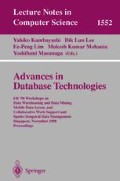Abstract
The ability of the deductive database to handle recursive queries is one of its most useful features. It opens up new possibilities for users to view and analyze data. This ability to handle recursive queries, however, still cannot be fully utilized because when recursive rules are involved, the amount of deduced facts can become very large, making it difficult and sometimes impossible to store, view or analyze the query results. In order to overcome this problem, we have proposed the DSK method and the DSK(S) method to discover characteristic rules from large amount of deduction results without having to store all of them. In this paper, we propose two new methods, the DSK(T) method and the DSK(ST) method which are faster than the DSK method and the DSK(S) method respectively. In addition, we propose a new sampling method called magic sampling, which is used by the two methods to achieve the improvement in speed. Magic sampling works when linear recursive rules are involved and the magic set algorithm is used for deduction.
Access this chapter
Tax calculation will be finalised at checkout
Purchases are for personal use only
Preview
Unable to display preview. Download preview PDF.
References
R. Agrawal, T. Imielinski, and A. Swami, “Mining Association Rules between Sets of Items in Large Databases,” Proc. of the ACM SIGMOD International Conference on Management of Data, vol. 22, no. 2, pp. 207–216, 1993.
R. Agrawal and R. Srikant, “Fast Algorithms for Mining Association Rules,” Proc. of the 20th VLDB Conference, pp. 487–499, 1994.
F. Bancilhon, D. Maier, Y. Sagiv, and J. D. Ullman, “Magic Sets and Other Strange Ways to Implement Logic Programs,” Proc. of the fifth ACM SIGMODSIGA CT Symposium on Principles of Database Systems, pp. 1–15, 1986.
F. Bancilhon and R. Ramakrishnan, “An Amateur’s Introduction to Recursive Query Processing Strategies,” Proc. of ACM SIGMOD’86, vol. 15, no. 2, pp. 16–52, 1986.
J. Barwise and J. Etchemendy, The Language of First-order Logic, 3rd Edition, Revised and Expanded, CSLI, 1992.
C. Been and R. Ramakrishnan, “On the Power of Magic,” Proc. of the sixth ACM SIGMOD-SIGACT Symposium on Principles of Database Systems, pp. 269–283, 1987.
Y. Cai, N. Cercone, and J. Han, “Attribute-Oriented Induction in Relational Databases,” in Knowledge Discovery in Databases, G. Piatetsky-Shapiro and W. J. Frawley (Eds.), AAAI Press/The MIT Press, pp. 213–228, 1991.
U. M. Fayyad, G. Piatetsky-Shapiro, and P. Smyth, “From Data Mining to Knowledge Discovery: An Overview,” in Advances in Knowledge Discovery and Data Mining, U. M. Fayyad, G. Piatetsky-Shapiro, P. Smyth, and R. Uthurusamy (Eds.), AAAI Press/The MIT Press, pp. 1–34, 1996.
W. J. Frawley, G. Piatetsky-Shapiro, and C. J. Matheus, “Knowledge Discovery in Databases: An Overview,” in Knowledge Discovery in Databases, G. Piatetsky-Shapiro and W. J. Frawley (Eds.), AAAI Press/The MIT Press, pp. 1–27, 1991.
C. Goh, M. Tsukamoto, and S. Nishio, “Knowledge Discovery in Deductive Databases with Large Deduction Results: The First Step,” IEEE Trans. on Knowledge and Data Engineering, vol. 8, no. 6, pp. 952–956, 1996.
J. Han, Y. Cai, and N. Cercone, “Knowledge Discovery in Databases: an Attribute-Oriented Approach,” Proc. of the 18th VLDB Conference, pp. 547–559, 1992.
J. Han, Y. Cal, and N. Cercone, “Data-Driven Discovery of Quantitative Rules in Relational Databases,” IEEE Trans. on Knowledge and Data Engineering, vol. 5, no. 1, pp. 29–40, 1993.
J. Han, Y. Fu, Y. Huang, Y. Cal, and N. Cercone, “DBLearn: A System Prototype for Knowledge Discovery in Relational Databases,” Proc. of ACM SIGMOD’94, vol. 23, no. 2, pp. 516, 1994.
S. Nishio, H. Kawano, J. Han, “Knowledge Discovery in Object-Oriented Databases: The First Step,” Proc. of the AAAI Knowledge Discovery in Databases Workshop 1993, pp. 299, 1993.
H. Kawano, K. Sonoo, S. Nishio, and T. Hasegawa, “Accuracy Evaluation of Rules Derived from Sample Data in VLKD,” Proc. of the ORSA/TIMS Joint National Meeting, p.144, Anaheim, California, U.S.A., Nov. 3–6, 1991.
Author information
Authors and Affiliations
Editor information
Editors and Affiliations
Rights and permissions
Copyright information
© 1999 Springer-Verlag Berlin Heidelberg
About this paper
Cite this paper
Goh, CL., Tsukamoto, M., Nishio, S. (1999). Fast Methods with Magic Sampling for Knowledge Discovery in Deductive Databases with Large Deduction Results. In: Kambayashi, Y., Lee, D.L., Lim, EP., Mohania, M.K., Masunaga, Y. (eds) Advances in Database Technologies. ER 1998. Lecture Notes in Computer Science, vol 1552. Springer, Berlin, Heidelberg. https://doi.org/10.1007/978-3-540-49121-7_2
Download citation
DOI: https://doi.org/10.1007/978-3-540-49121-7_2
Publisher Name: Springer, Berlin, Heidelberg
Print ISBN: 978-3-540-65690-6
Online ISBN: 978-3-540-49121-7
eBook Packages: Springer Book Archive

